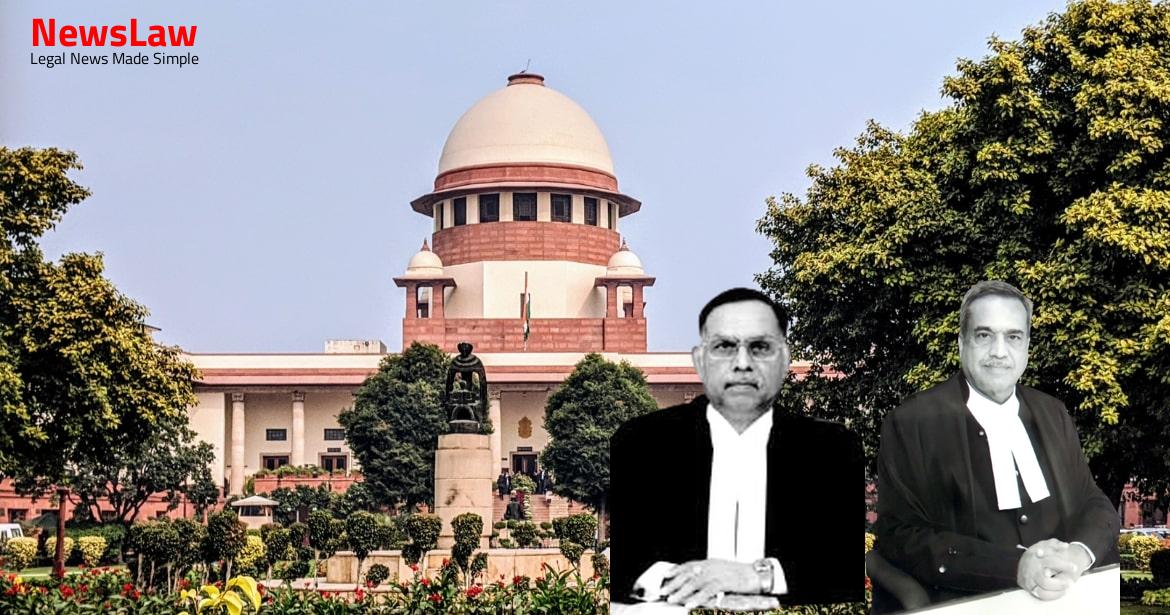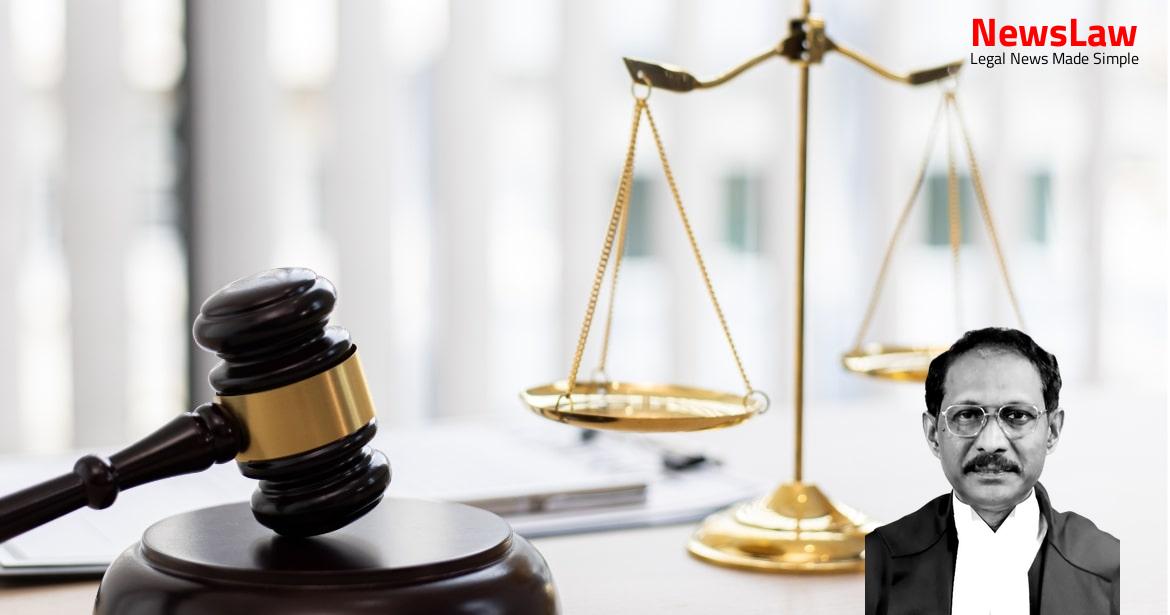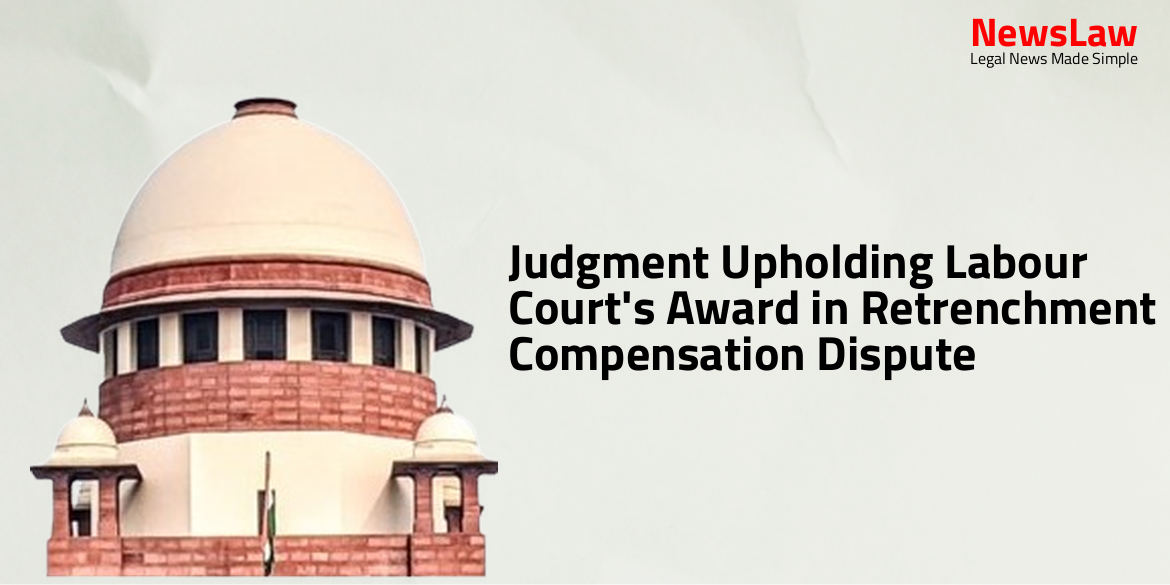Explore the legal scrutiny conducted by the court in a complex land lease dispute, focusing on the analysis of fraudulent claims and the validity of lease agreements. The case delves into key legal aspects such as the need for specific evidence to substantiate fraud allegations and the application of laws governing property transactions. Follow to dive into the legal analysis of this intriguing case.
Facts
- Additional District Magistrate directed to file intervention application within one month.
- Addl. District Judge directed not to dispose of enhancement application before decision on intervention application.
- The land belonged to Gaon Sabha Luhar Heri, Delhi.
- High Court permitted Additional District Magistrate to intervene in pending proceedings under Section 18 of the Act.
- Decree obtained by fraud in collusion with ex-Pradhan in the suit.
- Land leased in favor of appellants-plaintiffs.
- Respondents took possession of the land after 16.04.1981.
- Compensation claimed by respondents referring to lease by Gaon Sabha.
- Land acquired by Government, respondents claimed lease for cultivation.
- Order kept open for legal heirs of original lessee to claim compensation.
- Appeals filed against High Court judgment in R.F.A.Nos.204-8/2006 by Union of India.
- Notification issued under Section 4(1) of the Act on 27.01.1984.
- Civil Court passed judgment and decree in proceedings under Sections 30 and 31 of the Act.
- Villagers filed Writ Petition No.1408/1992 alleging collusion in claiming compensation.
- High Court disposed of Writ Petition No.1408/1992 on 21.02.1997.
- High Court allowed Regular First Appeals by setting aside judgment and decree passed by Addl. District Judge.
- Said suit filed seeking recovery of Rs.11,20,707/- with interest.
- Government took possession of land through Award No.101/86-87 on 19.09.1986.
- Appellants failed to plead necessary particulars to show how fraud was committed upon the court in the reference under Sections 30 and 31 of the Act.
- Gram Panchayat intended to lease the land for cultivation after removing ‘shora’, with approval from all members of the Gaon Sabha and Dy. Director, Panchayat.
- Auction for the land had six bidders, with the respondents offering the highest bid of Rs.89/- per acre which was accepted.
- The proposal for accepting the bid was also approved by the Dy. Director.
- A suit was filed by the appellants which was transferred to the Court of Additional District Judge, Delhi due to pecuniary jurisdiction.
- High Court found that entries in revenue records supported respondents claim of continued possession and cultivation of the land.
- Judgment and decree in previous proceedings under Sections 30 and 31 of the Act entitled respondents-claimants for compensation, with Panchayat entitled to seek enhancement only for their 13% share.
Also Read: Enhancing Compensation and Modifying Sentences: A Legal Analysis
Arguments
- The learned ASG argues that the judgment and decree in question were obtained through fraud, making them null and void.
- Citing various court judgments, the ASG contends that the respondents are not entitled to 87% of the compensation claimed.
- The ASG emphasizes that the lease was not created through collusion but through a legitimate auction process.
- The ASG distinguishes between a lease and a license, stating that the transaction should be considered a license due to the absence of a lease deed.
- The senior counsel for the respondents, on the other hand, asserts that the judgment and decree from previous proceedings under Sections 30 and 31 of the Act have become final.
- The senior counsel argues that the evidence shows the decision to grant the lease was legitimate and involved approval from the appropriate authorities.
- The senior counsel references court judgments to support the argument that the decree obtained through fraud can be set aside at any time.
- The main contention of the appellants is that the grant of the lease was fraudulent and there was no actual lease deed in favor of the respondents.
- The appeals by the respondents were allowed as the judgment and decree of the trial court were set aside based on the findings presented.
- The Additional Solicitor General claims that the respondents fraudulently claimed compensation.
- The senior counsel argues that even without a registered lease deed, the respondents are entitled to benefits under Section 53A of the Transfer of Property Act, 1882.
- The senior counsel emphasizes the need for sufficient proof to establish fraud, citing a specific court judgment supporting this argument.
Also Read: Transfer of Writ Petitions for Chartered Accountants’ Tax Audit Guidelines
Analysis
- The land in question was ‘banjar’ land with ‘shora’, which the Gram Panchayat intended to lease for cultivation.
- The respondents were in possession and cultivation of the land, as evidenced.
- Fraud was not established, as there were no specific pleadings or evidence provided.
- The highest bid in the auction for the lease of the land was submitted by the respondent.
- The approval for the lease was obtained from the Dy. Director of the Panchayat.
- The judgment and decree of 28.09.1989 was not questioned in any appeal and hence became final.
- The claim that the lease was obtained by collusion with the ex-Pradhan was not supported by evidence.
- Fraud needs to be pleaded and proved with specific particulars, which was lacking in this case.
- Approval for all stages of the lease process was obtained from the competent authority/Dy. Director, Panchayat.
- Defence under Section 53A of the Transfer of Property Act, 1882 is available to a person with an agreement of lease even if no lease has been executed and registered.
- The judgment in the case of Hamzabi states that Section 53A protects the possession of individuals who have acted on a contract of sale without a valid sale deed being executed or registered.
- The respondents were put in possession and the Panchayat acted upon their lease proposal, supporting the respondents’ case.
Also Read: Analyzing Interference with Acquittal in Legal Conviction Case
Decision
- These civil appeals are dismissed.
- No order as to costs is awarded.
Case Title: UNION OF INDIA Vs. M/S K.C.SHARMA AND CO.. (2020 INSC 488)
Case Number: C.A. No.-009049-009053 / 2011



